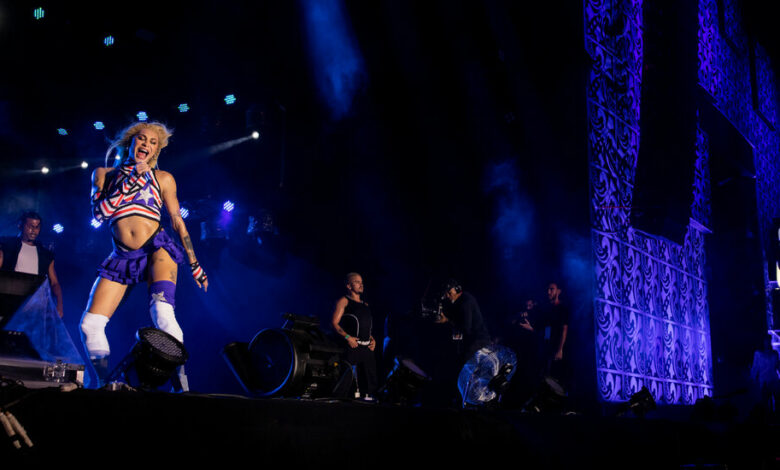The world’s next big drag queen is Brazilian

São Paulo’s main street was packed this month with thousands of people dressed in the yellow-green colors of the Brazilian flag, captivated by an imposing figure on a truck with loudspeakers.
Viewed from above, the scene could perhaps have passed for one of the many political rallies held at the same location by former President Jair Bolsonaro, the Brazilian far-right leader who infamously declared that he could never love a gay son.
(Although, to be fair, the huge rainbow flag would be a giveaway.)
It was, in fact, one of the largest Pride parades in the world and the person on the sound truck was Phabullo Rodrigues da Silva, 30, the gay son of a single mother from a working-class background in northern Brazil.
Yet everyone in the audience knew him as Pabllo Vittar, a 6-foot-1 transvestite in a shiny cut off brazilian football kit And shredded denim shorts – one of the biggest pop stars in this country of 203 million inhabitants.
“It’s so nice to see you in yellow and green!” Pabllo Vittar shouted to the crowd, many of whom wore fishnet stockings and G-strings. She had called on revelers to wear Brazil’s national colors to reclaim the Brazilian flag from Mr. Bolsonaro’s right-wing movement. “Let’s dance!”
RuPaul may still be the queen of queens, but the heir to the world crown has arrived.
Over the past seven years, Pabllo Vittar has become, by some measures, the most successful drag queen in the world. She has six studio albums (one gold, one platinum and two double platinum), her own fashion release with Adidas, a global advertising campaign with Calvin Klein and 1.8 billion streams of her songs.
She toured the United States and Europe; took the stage at Lollapalooza and Coachella; performed with Madonna at Madonna’s biggest concert; and sang at the United Nations for Queen Elizabeth’s birthday.
Pabllo Vittar calls RuPaul, 63, the American drag queen pioneer, an inspiration, even though they have never met. And RuPaul has squashed any discussion of competition. “I LOVE & SUPPORT @PablloVittar,” RuPaul wrote on Twitter in 2022. “Shame on you, catty Twitter trolls, trying to create rivalry.”
By the standard of the modern internet, however, it’s hard to deny that Pabllo Vittar has gone on to surpass her childhood idol. On Facebook, Instagram, Twitter, TikTok and YouTube, Pabllo Vittar has a total of 36 million followers, three times as many as RuPaul.
Pabllo Vittar has now become a symbol for the LGBTQ paradox in Brazil.
In addition to being home to a crew by break out drag starsBrazil has adopted some of the world’s models most comprehensive gay rights. Gay couples can marry and adopt children; transgender people can legally choose their gender; homophobic remarks are a crime; and so-called conversion therapy, which aims to turn homosexuals straight, is illegal.
Yet Brazil has been in first place for years among the deadliest countries for gays and transgender people. Since 2008, more than 1,840 transgender people have been murdered in Brazil, more than double the rate of the next deadliest country, Mexico, according to figures tracking by Transgender European advocacy group. Brazil has led the rankings every year since the tracking started.
“We never know when it’s going to be my friend, when it’s going to be my family, when it’s going to be me,” Pabllo Vittar said in an interview. “This is the biggest goal of my career: to make sure that younger people don’t feel this fear when they go out.”
Pabllo Vittar has emerged as one of Brazil’s loudest gay voices against a right-wing movement in the country, led by conservative Christian groups, that has made a heterosexual view of gender, sex and marriage a central part of its political strategy.
Pabllo Vittar was a sharp critic of Mr Bolsonaro during the 2022 elections. file a formal complaint of the former president’s campaign calls for his ouster from the stage at Lollapalooza. When Mr Bolsonaro lost to President Luiz Inácio Lula da Silva, a leftist, Pabllo Vittar headlined Mr. Lula’s inauguration concert.
“A drag queen taking the stage is already a political act,” said Pabllo Vittar. “I show the child and the mother in the back that they can be where I am too, to not be afraid, to not give up on who they are.”
For Pabllo Vittar’s gay and transgender fans, she has been a powerful source of inspiration.
“She gives us such a sense of security,” says João Rabelo, 28, a publicist from the northern Brazilian city where Pabllo Vittar was born. “Today I can walk down the street with my boyfriend without fear of death.”
While audiences largely see Pabllo Vittar dressed as a woman, the star lives life as a man. Gender “is a social construct,” said Mr. Rodrigues da Silva (the star’s real name). “The most important thing is how we feel inside. I feel like a boy, and when Pabllo Vittar arrives, I am not yet a woman.”
As for pronouns, she is indifferent — when she has no resistance left. “If I’m doing drag, I use the feminine, for the love of God,” she said.
In a sense, the lifestyle has created two separate lives: Phabullo, the man, and Pabllo, the drag queen.
Phabullo is a prisoner who lives with his mother, stepfather and sister in a luxurious house in a small town in the Brazilian Midwest. As Pabllo, she works in a small apartment in São Paulo, the largest metropolis in Latin America.
Phabullo is shy and hates to talk about himself. Pabllo is the opposite. “If the blonde was here, she’d hit on you,” the star told me in an interview, not in drag, about his alter ego. “She’s sassy. She’s naughty. I’m not.”
And yes, he talks about his drag act in the third person. “Because she really is a third person,” he said. “If I do something like Pabllo Vittar and it spills over into my life, where I’m shy, I hate that. I want to crawl into a hole.”
Mr. Rodrigues da Silva was born in Maranhão, Brazil’s poorest state, to a single mother who worked as a nurse technician. By age 5, he was already looking for the stage, starting with the church choir. “I just wanted to sing,” he said, “and I wanted people to see me sing.”
He said he was made fun of by classmates for being effeminate, but his mother always supported him. In his teens he sang on YouTube and in bars. Then, at a Halloween party at a gay club on his 18th birthday, he tried drag.
“I had never experienced such a powerful sense of freedom – that I could express what was going on in my head,” he said.
At the same time, a video of him singing a Whitney Houston song went viral. The club’s owner, Yan Hayashi, and a music producer, Rodrigo Gorky, quickly saw the potential and began managing Mr. Rodrigues da Silva as Pabllo Vittar. (The name was a tribute to a drag queen Mr. Rodrigues da Silva previously knew.)
Pabllo Vittar quickly landed a gig fronting a band on a late-night variety show. Then she started releasing music, and in 2017 she had Brazil’s number 1 song.
Pabllo Vittar has since become one of Brazil’s most reliable draws, with a soaring voice, elaborate dance routines and an energetic stage show. She has also developed a moderate international following, mainly among the LGBTQ community, but is now working on an album that mixes English and Spanish.
Chicago native Owen Mallon, one of Pabllo Vittar’s three managers, is tasked with figuring out how to turn a Portuguese-speaking drag queen into a bankable international star. Still, he’s consistently impressed by the response.
“Even though people don’t know the language, they love it and what it represents, and the show speaks for itself,” he said.
Her music ranges from pop to electronic to Brazilian. Her latest album includes popular music from the North and Northeast of Brazil, where she grew up, including forró, with its accordions, and tecnobrega, with its synthesizers.
After sitting for an interview as Mr. Rodrigues da Silva, she appeared hours later as Pabllo Vittar a charity concert in her native state of Maranhão. The transformation usually takes three hours. (Like an athlete collecting free sneakers, she has amassed a collection of 200 wigs that have been donated a london wig maker.)
She wore a tight top that imitated the state flag, a blonde wig, white boots, a small skirt and a G-string. As she waited to take the stage with her group of male dancers in the Brazilian heat, her hairdresser used a fan to cool her butt.
“My favorite place in the world,” she said. Then she said stepped onto the stage and the crowd erupted.




